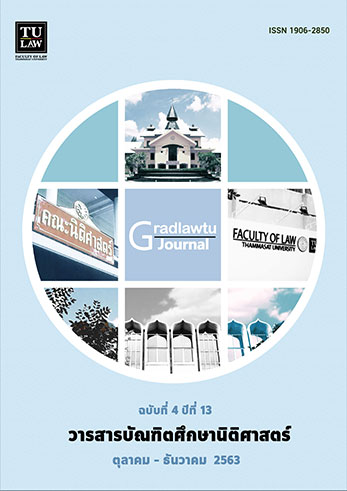THE REFORMATION OF LAWS CONCERNING EMPOWERMENT DISABLED PERSONS
Keywords:
fund reformation, juristic person, service center for disabled persons, professionAbstract
The United Nations declared the year 1981 as the International Year of Disabled Persons, calling for national governments to promulgate legislations with regards to the rehabilitation of disabled persons. During this era, General Prem Tinsulanonda, acting as the Prime Minister, announced a policy to legislate an Act dedicated to fulfilling such objective. However, his term came to an end before the policy could take effect.
Networks of disabled persons, led by The council of disabled persons of Thailand association, successfully lobbied for the enactment of the Rehabilitation of Disabled Persons Act B.E. 2534 (1961) in 1961. The United Nations subsequently adopted the Convention on the Rights of Persons with Disabilities which emphasizes in creating equal opportunities for disabled persons. In the meantime, Thailand continued to develop the Rehabilitation of Disabled Persons Act in parallel with the Convention. Finally, the Rehabilitation of Disabled Persons Act was superseded by the Persons with Disabilities Empowerment Act B.E. 2550 (2007). Both legislations made clear the significant of the need to organize a fund in which would take form of a juristic person, but this has not been materialized even until today. Nonetheless, the idea was proposed during the social reformation pursuant to the National Reform Plans and Procedures Act B.E. 2560 (2017).
The process of rehabilitating disabled persons, and thus equalizing opportunities indiscriminately, is acknowledged to require substantial funding, and to simply rely on the government budget of a developing-country is not enough. Therefore, the Rehabilitation of Disabled Persons Act and the Persons with Disabilities Empowerment Act prescribed the establishment of a fund. Additionally, disabled persons have campaigned for a draft legislation to provide a basis of creating such Persons with Disabilities Empowerment Fund as a juristic person. This approach was deemed beneficial because the juristic person can also take on a role as a service center for disabled persons with a clear purpose of rehabilitating and equipping disabled persons with skills necessary for daily activities, as well as offering vocational training and encouraging the application of the training in their professions to earn incomes to financially support themselves and their families.
Several established service centers for disabled persons have been encouraged to set up in locations around the country as to ensure that vocational training would be accessible throughout the country, aiming to create income-earning opportunities for disabled persons. According to the 20-year national reformation plan, the goal is to increase employment of disabled persons by 80 per cent or have 680,218 disabled persons amongst the working age population in employment, a drastic increase from the current number being 265,918. Disabled persons would no longer be a burden to their family or society, but instead they would be empowered to contribute in driving the economy forward through economic stimulation resulting from their incomes and spending as part of being employed. Thus, purely benefits can derive from the policy of rehabilitating disabled persons. Consequently, the public and the private sector, and the disabled must join in the collective efforts to ensure successful implementation of this plan. The outcome of which will certainly be of service to disabled persons, their families and Thailand as a nation.
References
Downloads
Published
Issue
Section
License
บทความหรือข้อความคิดเห็นใด ๆ ที่ปรากฏในวารสารบัณฑิตศึกษานิติศาสตร์เป็นความรับผิดชอบของผู้เขียนบทความโดยเฉพาะ คณะนิติศาสตร์ มหาวิทยาลัยธรรมศาสตร์ และกองบรรณาธิการไม่จำเป็นต้องเห็นด้วย



